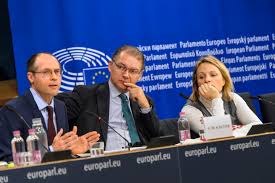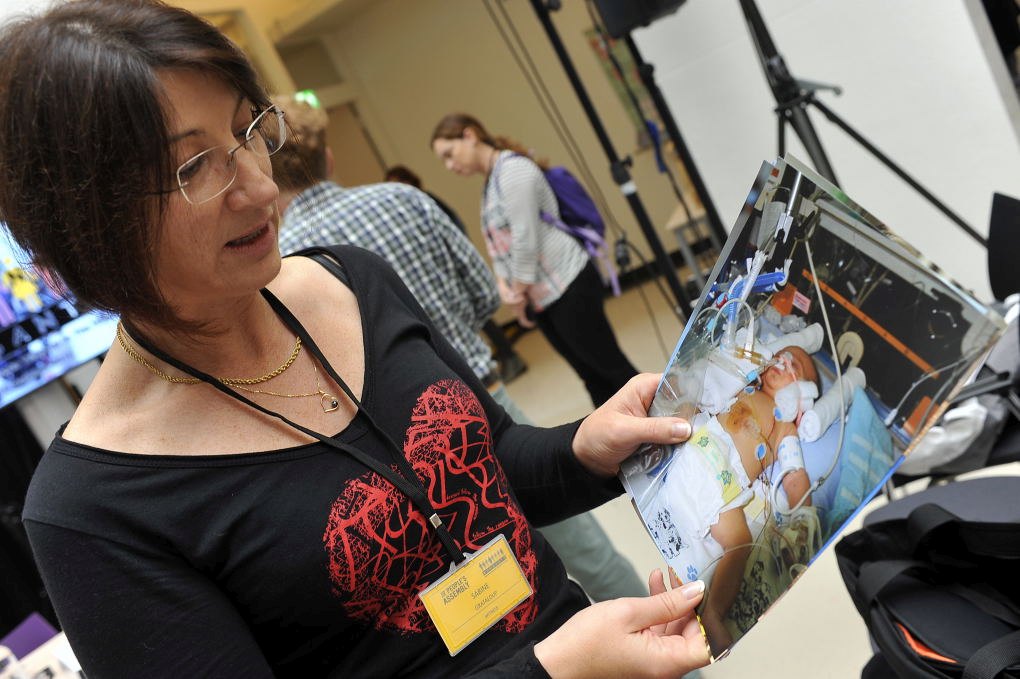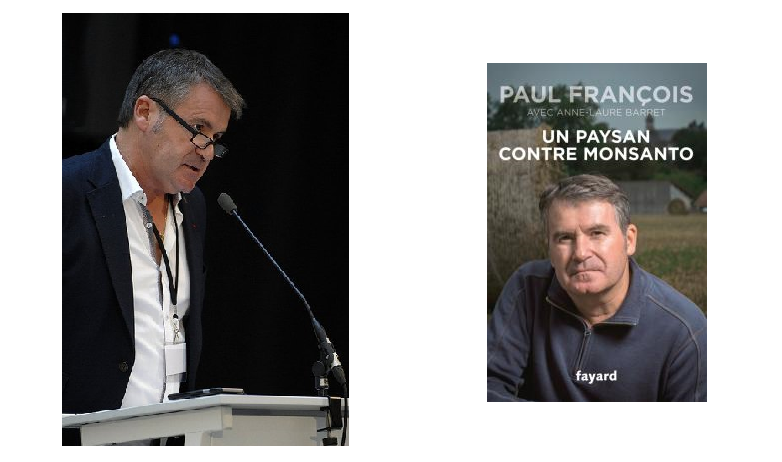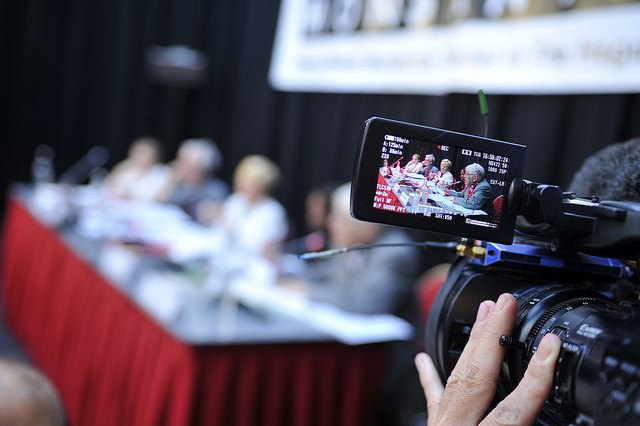In this newsletter: the failure of Bt coton in India and dicamba in the US, the glyphosate battle in the UE, news from the witnesses, the new NGO Justice Pesticides and the Monsanto Tribunal "Making of" documentary.
2017 has been the year of a great and ever growing opposition to Monsanto and the poison companies that try to control our food system. The legal opinion of the Monsanto Tribunal was a highlight. For the very first time, Monsanto victims from all over the world came together and convinced a panel of international judges that the company is violating basic human rights. We did not manage to stop the re-authorization of glyphosate in the EU, but instead of green light for a 15-year period, Monsanto got a 5-year permit. France and Italy are discussing a 3-year phase out of the herbicide. An impressive 1.3 million people signed the citizens' initiative and discussions on the behavior of Monsanto were all over the news in many countries. A court case of glyphosate victims in the US led to the release of the 'Monsanto Papers', that show Monsanto is manipulating science, press and politics. More documents and evidence of Monsanto's misbehavior will follow in spring.
In the meantime, Monsanto’s cash machines are grounding to a halt. The introduction of their new dicamba resistant GMO crops turned into a disaster as 3.6 million acres op crops (1,5 million hectares) are damaged by pesticide drift. Already over a 1000 farmers in the US are suing the company for the damage. The new generation of BT crops is supposed to fight insects has failed in India. Weed and insect resistance are nature's answer to those crops.
Monsanto is trying to hide these failures by stepping into other fields of destruction. They try to tighten their grip on agricultural data, to get even more control on the food system. They will probably merge with Bayer to increase control and try to hide the bad name of the company, but Bayer is buying a Trojan horse. The share value of Monsanto is massively overrated, because both techniques on which the GMO revenue model depends are failing. More and more people, farmers, and consumers see that we have to change the food system to stop the ecocide. A German study shows us that the insect populations in nature reserves have decreased by 75% in the last 27 years. This sent shock waves through the world. Humans cannot survive if we kill all life around us, and we have to work with nature instead of against it. The era of highly toxic, fossil fuel dependent and soil and resources depleting chemical agriculture must come to an end, and leave space for agroecology to thrive. The sooner the change of agriculture paradigm, the better: help wherever and whenever you can, for ourselves and especially our children and grandchildren.
Glyphosate Battle in Europe
The European permit for the world's best-selling herbicide glyphosate was expiring in December 2017. The EU Commission proposed to renew it for another 15 years. This caused a storm of protest. The proposal was based on reports by the food authority EFSA and the German BfR, proven to be highly biased. Part of the text was even copy pasted from a Monsanto lobby group, the Glyphosate Task Force. The process shows that industry lobbyists have been very successful in creating an industry-friendly environment. The criteria for the assessment of scientific studies that have been adopted exclude all independent studies. This caused EFSA to discard 106 studies as ‘not according to standards’. Instead, they based their advice on secret industry studies, that cannot be verified independently. It comes down to Monsanto ‘proving’ that glyphosate is safe and all studies that say otherwise are ‘not scientific’. So much for the EU food safety regulations (and in the US possibly even worse).
Many people were furious. Over 1.3 million Europeans signed a citizens' initiative asking for a ban on glyphosate. Since this process has exposed the biased role of EU institutions, their credibility is seriously undermined. It has shown that the pesticide approval system has to change, but for the moment it is unfortunately too late for glyphosate.
The EU Parliament asked for a 3-year phase out with help for farmers to change their system of production, but the decision is the mandate of the Council of member states and the EU Commission. A vote by the member states did not bring a qualified majority: main countries like France and Italy opposed a 10-year renewal. In the last voting round for a 5-year renewal, no qualified majority by member states was expected. In which case the Commission would have had the final say and would have given the green light for a 5-year extension. But this was not necessary, as a surprise change by Germany created a majority. Against the will of his Environmental Minister colleague, Agriculture Minister Christian Schmidt ordered to vote yes. Apparently the long arm of Bayer-Monsanto reaches right into the German government. ‘This is a scandal, a slap in the face of the environment and consumers,’ said a parliament member.

Although the German vote is contested, most people stated it cannot be undone. But legal specialist Olivier De Schutter thinks there is a way. In a press conference on December 12th, four EU Parliamentarians announced that they will start a legal procedure to annul the vote. Whatever the outcome, glyphosate will now be outfaced in several countries over the next 3 to 5 years. Too late, but much better than ‘toxic business as usual’. Read here Olivier de Schutter's legal analysis in English or in German.
Dicamba Disaster: Monsanto’s stillborn child?
Monsanto’s commercial success is based on the combination of seeds and herbicide. Millions of acres in the world are covered with Monsanto Roundup crops: soy, corn, D, canola, cotton, etc. Both seeds and the glyphosate herbicide are sold by Monsanto, bringing huge profits. However, weeds have grown resistance to Roundup and the commercial success is fading. A new generation of herbicides was supposed to counter this problem, but no new herbicide was found and instead they had to go back to an older and possibly even more toxic herbicide: dicamba. It was introduced in 1963 and Monsanto signed a deal for the production with BASF. Billions have been invested in testing and marketing the new dicamba resistant crops. Apart from its toxicity to plants, humans and soil, there is another problem: drift. The poison is taken by the wind and brings death or serious damage to trees and other crops that aren’t genetically modified to withstand dicamba. Many farmers have lost part of their crops. As a result, individual lawsuits and class action cases have been filed against BASF and Monsanto in more than two dozen US States. In 2017, dicamba drift damaged over 3,6 million acres of crops in 25 states.
This could become a very costly affair for Monsanto. And worse for them, it could be a major setback for the chemical agriculture.
BT Technique Failure
Not only weeds are beating Monsanto and biotech warfare. A small, thin, gray moth is creating havoc in the cotton fields of India: its larva, a caterpillar – called the pink bollworm for its pink banding – eats the plant. To fight this cotton pest, a gene from a bacteria was introduced in the cotton so the 'Bt plant' produces a toxin that should kill the insect. When GM cotton seeds were introduced to the Indian market 15 years ago, the seed companies said that farmers would not have to spray any insecticides and that they would get great yields. Today, because of the very same GM seeds, use of insecticide and fertilizer has increased fivefold and eaten into farmers' incomes. Resistance to the poison could not occur, according to the creators of the GM plants. Nature thought otherwise. A huge outbreak of Bt resistant bollworm has now seriously damaged the crops of many farmers. Desperate farmers apply highly toxic pesticides to fight the pest, sometimes with lethal effects.
Dr. K.R. Kranthi, former director of Central Institute of Cotton Research (CICR), reported that pink bollworm has developed resistance to Bt cotton (Bollgard-II variety) not only in Maharashtra, but in other cotton-growing states as well. Bollgard-II was introduced in 2010. ‘There are only two benefits of Bt cotton. One, it controls bollworm, due to which the yield is protected. Two, it reduces use of insecticides meant for bollworm control. Currently, cotton growers do not get either benefit,’ said Dr. Kranthi.
Veteran farmer leader Pasha Patel says: ‘For Maharashtra’s cotton growers, it’s like a night without dawn.’ Another GM technology is failing. Follow the latest developments on GMWatch website and twitter.
NGO Justice Pesticides
One of the results of the Monsanto Tribunal was the creation of the NGO Justice Pesticides in July 2017. It aims at making legal data on pesticides cases from all around the world available to all, regardless of people’s status or nationality: neighbors, farmers, local authorities and communities, scientists… Victims of pesticides are, of course, first on that list. The organization is presided by Corinne Lepage. It counts members of the MT organization committee, and people from all continents who have faced the consequences of pesticides on health, natural resources, or their activities.
The goal of Justice Pesticides is to create a huge collaborative network to pool pesticide-related legal action data from everywhere in the world. This way, legal and scientific information will foster future lawsuits. Eventually, Justice Pesticides aims for banning pesticides which are threatening human health and the environment.
You can help Justice Pesticides by sharing the legal information you know of via the online form.

News from the witnesses
- The Grataloup Family
Sabine Grataloup was the first person to testify during the Monsanto Tribunal hearings in October 2016. She described the birth defects her son Theo is suffering from, after she was exposed to a glyphosate-based herbicide during the beginning of her pregnancy. Meeting other witnesses in similar situations motivated Theo’s parents to go one step further. Together with William Bourdon (Monsanto Tribunal’s lawyer who plead on the freedom indispensable to scientific research), Sabine and Thomas Grataloup have announced their intention to start a legal action against several glyphosate-based herbicides manufacturers, including Monsanto. They want the justice system to recognize a causal link between those products and Theo’s issues. They are now investigating the different legal options to do so, and are getting ready for a difficult, yet necessary legal battle. Click here to know more.

- Paul François
This French farmer got involved in a long legal struggle against Monsanto, after being poisoned in 2014 with Lasso (an herbicide now banned). Before the Monsanto Tribunal judges, he described the harassment he has been undergoing from the company. Paul François recently released the book ‘A peasant against Monsanto’ to tell his story in detail. Unfortunately, he now has to go back to court to try to get a financial compensation from Monsanto. Paul François set a crowdfunding campaign needs to be able to continue this exhausting battle. Together, let’s support him! Read more about his book and case here and make a donation here.

Call for Support: Monsanto Tribunal ‘Making-of’
Film director and writer Marie-Monique Robin was the patron of the Monsanto Tribunal. In her latest documentary movie and eponymous book ‘Roundup on Trial’, she follows several glyphosate victims and experts among those who came to testify before the Monsanto Tribunal judges, and provides an understanding of the mechanisms of one of the greatest environmental and health scandals in modern history. The film was broadcast on the French-German TV channel Arte, on RTBF (Belgium), RTS and RSI (Switzerland), NRK (Norway), RTP1 (Portugal) and soon in Canada and Poland. It is available in French and German on Arte’s website. You can also get the English version by writing to: contact@m2rfilms.com.
Besides, Marie-Monique has made a second documentary, ‘The International Monsanto Tribunal’, which tells the story of this extraordinary project, from the first press conference in Paris in December 2015, during the COP21, until the delivery of the advisory opinion by the judges in April 2017: actions to mobilize international civil society, debates on legal issues (status, goals and functioning of the Tribunal, crime of ecocide…), financial questions, research of victims and experts, meetings with the five international judges, hearings, etc. This making-of documentary is to be freely accessible on the internet. It aims at being a tool for information and awareness-raising for a large audience, but especially targets lawyers, human and environmental rights activists and schools and universities.

In order to finish this movie in five languages (English, French, Spanish, German and Portuguese), the Monsanto Tribunal Foundation would need €20,000. Please make a donation now if you can. Thank you!

